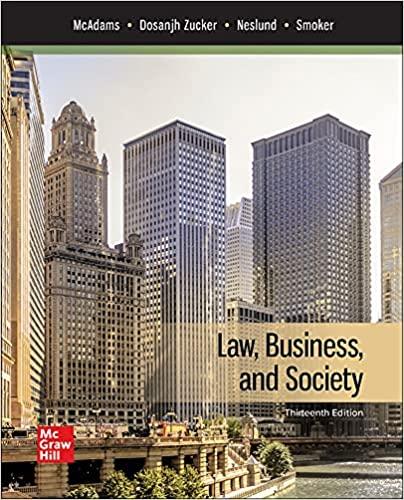In Doe v. Nestle USA, Inc., three former child slaves brought claims under the Alien Tort Statute
Question:
In Doe v. Nestle USA, Inc., three former child slaves brought claims under the Alien Tort Statute against a number of defendants alleging they aided and abetted child slavery by providing assistance to farmers in the Ivory Coast. The defendants argued that the complaint should be dismissed based on the Supreme Court’s ruling in Kiobel v. Royal Dutch Petroleum Co., which held that ATS is subject to the traditional presumption against extraterritorial application. The Ninth Circuit Court of Appeals, however, allowed the case to proceed on the basis that the defendants acted with the purpose to facilitate slavery, a plan that starkly distinguished the case from other ATS decisions in which the defendants merely profited by doing business with known human rights violators. It also remanded the case to allow the plaintiffs to amend their complaints to allege that some of the activity underlying their ATS claim, such as planning the promotion of child slavery overseas, took place in the United States. The defendants appealed the decision to the Supreme Court. The Court, however, denied certiorari, thus refusing to review the Ninth Circuit’s controversial decision. One commentator has concerns that the Ninth Circuit’s decision will open the doors to many other ATS claims, and that corporations can potentially be held liable under ATS for the tortious acts committed outside the United States by foreign actors with whom they do business, “so long as the company intended to turn a profit.”100 See Doe v. Nestle USA, Inc., 766 F.3d 1013 (9th Cir. 2015) and Kiobel v. Royal Dutch Petroleum Co., 133 S. Ct. 1659 (2013).
a. Do you agree with this characterization of Nestle’s alleged actions—that it merely did business with foreign actors, who committed tortious acts, in order to turn a profit?
b. Do you think that Nestle should not be subject to an ATS claim in the United States if its alleged actions were limited to aiding and abetting child slavery overseas?
c. What if the corporate defendant allegedly undertook planning in the United States to facilitate child slavery in order to maximize its profits?
Step by Step Answer:

Law Business And Society
ISBN: 9781260247794
13th Edition
Authors: Tony McAdams, Kiren Dosanjh Zucker, Kristofer Neslund, Kari Smoker





